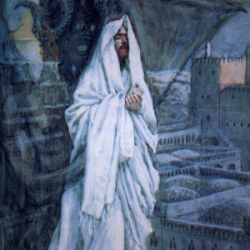A new cake recipe, for example, is mostly the same old ingredients: flour, sugar, water, butter ... with some small but significant new twists. You wouldn't have to eliminate flour, sugar, water, and butter in order to call it new, right? So if someone says, "McLaren's book is just promoting warmed-over liberalism," that may be enough to dissuade some folks from reading my book or taking it seriously. But at the same time, other folks are getting a little tired of having evangelicals paint themselves into a corner where questions can't be asked and discussed freely because those who do so will be labeled with a scarlet "L."
The way we set up these critiques, we really can paint ourselves into a corner. If you say, "Let's go back to the gospels and focus there," I can accuse you of neglecting Christian tradition --"orthodoxy" -- and say you're being a-historical. If you draw from elements in the tradition -- whether from the social gospel movement or the Celtic tradition or the Franciscans, for example -- I'll say you're offering nothing new. If you propose something radically different, I'll accuse you of excessive novelty and arrogance -- who do you think you are to suddenly set everyone right? If you don't propose something radically different, I'll accuse you of insignificance and repetition.
When it comes to A New Kind of Christianity, if I'm proposing the same old thing, why are some people so upset and others so enthusiastic? If I'm proposing something totally unprecedented, why say it's the same old thing? That's why, in the end, I hope people will actually read the book with an open heart and mind. I'm not expecting that anyone will agree with everything -- that's not my point. But I am hoping that people will be stimulated to think, and maybe even to dream of better possibilities ... so the Christianity of the future can continue to learn and grow and not simply repeat the past or be stuck in the present.
One thing you describe in A New Kind of Christianity is a "Greco-Roman narrative" that the early church inherited and that has served over the centuries to distort the original teachings of Jesus. Some are concerned that this caricatures traditional Christian theology, which includes a variety of standpoints on the Fall, original sin, the material world, sexuality, and so forth. Is the Greco-Roman narrative what a responsible theologian would teach, or do you believe that it prevails or has prevailed more on the popular level?
Thanks for asking about this. I would say that the early church -- before the 4th century -- was largely free of the Roman part of the narrative. It was the post-Constantine Church -- and much more so in the West than the East -- that tended to embrace both the political and philosophical dimensions of the narrative, albeit unconsciously. And thank God, there have always been minority reports -- the Eastern tradition for starters, but also streams in the Western church that resisted some or all of the imperial narrative, including the desert fathers and mothers, the Celts, the Franciscans, the monastics and mystics, the Anabaptists and others in the Radical Reformation, the early Jesus People, the New Monastics, the Black and Liberation and feminist theologians, and so on. I've been wondering lately if Luther was trying to target what I'm calling the Greco-Roman narrative in his repudiation of "theology of glory" in favor of the "theology of the cross."
So, back to your question. Take the church in America today. We have this powerful movement called the Religious Right composed largely of well-mobilized evangelicals and Catholics. Many of them love and are deeply influenced by Sean Hannity, Bill O'Reilly, Glenn Beck, Rush Limbaugh, the Tea Partiers, the Left Behind novels, Pat Robertson, John Hagee, and Christian Zionism -- even though you'll seldom, if ever, hear those names or causes celebrated at the Evangelical Theological Society or the Conference of Catholic Bishops. Or to put it differently, in my travels around the world, I'd have to say that Joyce Myers and Benny Hinn are far more influential than John Stott or C. S. Lewis on the popular level.
Christian scholars may have a dismissive opinion of these popular movements in our day similar to that of the Pharisees toward popular movements in their day (John 7:47-49), but the Religious Right, Christian Zionists, and Prosperity Gospel folks can become a powerful force when mobilized to win elections, launch wars, determine budgets, pass laws, scapegoat minorities, and so on -- all based on a theology that serious scholars could easily critique. Of course, one wonders why the scholars so often seem content to speak to one another and ignore these popular movements when so much is at stake.
And one wonders why some voices, in responding to my book, seem very energetic to defend what I describe as the Greco-Roman narrative as the biblical narrative. I don't think you can have it both ways. You can't say, "McLaren is drawing a caricature that no serious scholars hold," and then have others say, "McLaren is throwing out the historic, orthodox Christian faith that we hold."




